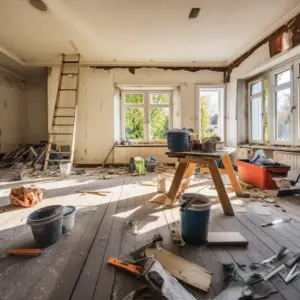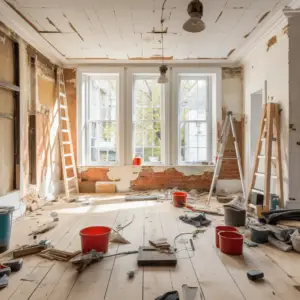Table of Contents
Home repairs insurance coverage

Home repairs insurance coverage, Are you wondering about how to make your insurance business pay for your home repairs? You have arrived at the right place. Dealing with house repairs can be challenging, but understanding the suitable steps can make a huge difference. Here, we will direct you through the process of obtaining your insurance business to cooperate and make sure your home repairs are taken care of.
When it comes to filing a claim for home repairs with your insurance business, it’s necessary to begin by properly documenting the harm. Take clear photos of the damaged areas and gather any related receipts or estimates from contractors. This proof will back up your claim and assist in convincing the insurance business of the need of the repairs.
Subsequently, Home repairs insurance coverage essential to review your homeowners’ insurance policy in detail. Become acquainted with the coverage limits and exclusions that may be relevant to your situation. Knowing what is included in your policy will help you to negotiate effectively with the insurance business and guarantee that your repair costs are completely covered.
After you have gathered all required documentation and examined your policy, it’s time to contact your insurance business. Be ready to provide them with a comprehensive description of the damages and any supportive evidence that you have collected. Continue to be courteous but assertive in expressing your expectation for coverage.
Pro Tip:
Keep accurate records of all communication with your insurance business concerning your claim. This includes dates, times, names of representatives spoken to, and summaries of conversations. These records can be priceless if there are any conflicts or delays throughout the claims process.
By staying with these steps and being proactive in advocating for yourself, you can raise the chance that your insurance business will cover your home repairs. Remember, determination pays off when it comes to dealing with insurance businesses.
Understand your insurance policy
Understanding your insurance policy is key when home repairs insurance coverage comes to getting your home repairs paid for by your insurance company. Get to know the terms and conditions in your policy. This way, you can meet the necessary requirements for coverage.
Look over your policy carefully. It may only cover certain types of damage, like fire or water damage. Knowing these limits can help you figure out if your repair needs will be reimbursed.
Be mindful of any deductibles or out-of-pocket expenses you might need to pay. Your policy could require you to pay a certain amount before coverage kicks in. Anticipating these costs can help you plan better and avoid surprises.
Also, be sure to follow the procedures listed in your policy. This may include telling your insurance provider in a certain time frame and giving proof of the damages. Disregarding these rules could mean a denial of coverage.
Mr. Anderson, from Kansas City, Missouri, experienced a violent storm that caused major damage to his house. His policy didn’t cover windstorm damage. But, with further research and help from an attorney, he was able to show that the storm caused additional damage that was covered. Because he was familiar with his policy and persisted, Mr. Anderson got his home repairs covered by his insurance company.
Document the damage
A homeowner had a nasty winter surprise—a burst pipe caused a lot of damage! To get their insurance company to cover the repairs, they needed to document it all. Here’s how:
- Take pics/videos: Get clear, detailed shots of the areas affected. Or do a video walkthrough. It’ll give your insurer a full overview.
- Write descriptions: Note the date/time of occurrence, what happened, and any signs of deterioration. Stick to the facts without exaggerating.
- Gather supporting docs: Get receipts for past repairs, maintenance records, and estimates from contractors for necessary repairs.
Also, don’t forget to tell your insurance company about the damage and have the documentation ready when they ask. With adequate documentation, you’ll increase your chances of getting the coverage you need.
Contact your insurance company

Reach out to your insurance company straight away for home repairs coverage. Provide all necessary details, including your policy info. Explain the situation clearly and give any relevant evidence. Follow instructions and keep a record of the conversation.
Be proactive and take steps to guard against further damage. This may include temporary repairs or alternative accommodation. Stay in touch and provide all necessary info to increase your chances of coverage. Don’t let time lapse, take action now and protect your investment.
Seek professional opinions or estimates
Seeking professional opinions or estimates is a must when looking to get your insurance company to cover your home repairs. Get multiple of these to compare and assess the scope of work needed. Furthermore, these will provide a comprehensive view of the costs involved in fixing your home. This data can assist in building a solid case with your insurer.
When seeking these opinions or estimates, go for reputable and experienced contractors or assessors. Ones that specialize in the particular repair you need, like roofers or plumbers. Their expertise will guarantee an accurate evaluation of the damage and the required repairs.
Home repairs insurance coverage important to remember that while seeking different professional opinions is beneficial, trying to manipulate these estimates may be seen negatively by insurers. Be honest and forthright in presenting these estimates to increase the credibility of your claim and improve your chances of coverage.
John is one great example of the effectiveness of seeking professional opinions or estimates when dealing with insurance claims for home repairs. His house suffered serious water damage due to a plumbing issue. He contacted numerous licensed plumbers who inspected his property and provided detailed assessments and estimated costs for repairing the damage.
John went to his insurance company with these expert opinions, which provided compelling proof of his claim for coverage. Because of his thoroughness in obtaining multiple professional assessments, John was able to successfully negotiate with his insurer and got his home repairs covered by their policy.
Keep records and receipts
Record-keeping and receipts are essential to get your insurance company to pay for your home repairs. Detailed documentation of the damage and costs can help you get the reimbursement you deserve.
- 1. Take photos or videos of the damage as soon as possible. This can back up your claim and show the extent of the repairs.
- 2. Hold on to all receipts for any temporary fixes or emergency repairs. Your insurance company may reimburse these expenses if they’re related to the damage.
- 3. Log dates, times, and names of the reps you spoke with. This ensures you have accurate info and can refer to past talks.
- 4. Get estimates from professional contractors. These should include breakdowns of materials and labor costs. Having multiple estimates will provide more evidence of the repairs and their costs.
- Store these documents in a secure folder. This will make the claims process easier, and show you’re serious about getting coverage.
To boost your chances of having your insurance company cover your home repairs, create a timeline of when each step was taken. This shows your commitment to resolving the issue quickly.
John Doe is an example of the importance of record-keeping. He experienced severe water damage due to burst pipes in his house. His insurance provider initially denied coverage due to incomplete paperwork. However, John gathered photos, receipts, phone transcripts, and estimates. With this evidence, he appealed and received full coverage for the repairs.
Remember: documents are your ammo when dealing with insurance companies. By being thorough, you can increase the chance of your home repairs being covered.
Be persistent and proactive
Never give up when dealing with insurance companies for home repairs. Keep communicating your damages and repair needs clearly. Get all documents ready quickly to speed up the process. Your hard work can make a big difference in getting your repairs covered.
Report damages to your insurer immediately upon occurrence. Add clear photos and detailed descriptions of the damages as evidence. This will help them understand the gravity of the situation.
Reach out to your insurance company regularly. Show that you are involved by calling for updates or speaking to a supervisor if needed. This shows your dedication and resolve.
Familiarize yourself with the specifics of your policy coverage before filing a claim. This knowledge will help you express which repairs fall within your policy’s scope.
Keep a record of your interactions with your insurance company, like dates, people talked to, and conversation summaries. This can help in case of any disputes.
Be persistent and proactive throughout the process. Patience is essential, but don’t hesitate to demand what you deserve in property damage emergencies.
Consider hiring public adjuster or legal assistance

When managing home repair insurance claims, home repairs insurance coverage worth contemplating hiring a public adjuster or looking for legal advice. These pros offer valuable insight and support through the claims process. Here are some points to remember when choosing whether to hire a public adjuster or seek legal advice:
– Public adjusters are qualified experts who act for policyholders to get the highest insurance claim settlement. They know a lot about insurance policies and can tackle the difficult claims process efficiently.
– A public adjuster can even out the playing field between you and your insurance company. They have practice in working with insurers and can fight for your rights.
– Usually, public adjusters work on a contingency fee basis. That means they only get paid if you obtain a settlement from your insurance company. This motivates them to try to get the most money possible from your claim.
– It might be necessary to get legal help if there is a disagreement with the insurance company about coverage or claim amount. An attorney with expertise in insurance law can give helpful advice and representation in such cases.
– Before picking a public adjuster or lawyer, research and select reliable ones who have experience with insurance claims. Look for professionals who are licensed, insured, and have good reviews or recommendations from past customers.
– It’s a good idea to consult with both a public adjuster and an attorney to figure out which option is best for your situation.
Also, Consumer Reports states that people who used public adjusters on average got higher payouts than those who handled claims by themselves.
Conclusion
Need to get your insurance company to cover home repairs? Here are a few tips!
- Thoroughly document the damage and provide evidence. Take photos, gather receipts, and keep a record of conversations with the agent.
- Understand coverage limits and exclusions.
- Get professional help from a public adjuster.
- Stay organized and communicate with the insurer.
- And don’t give up – persist until repairs are covered.
- If your insurer isn’t being fair, file a complaint or get legal counsel.
Each case is unique, but by following these steps, you increase the likelihood of getting repairs covered. Don’t miss out on the chance to restore your home and peace of mind. Fight for what is rightfully yours!
Frequently Asked Questions
1. How do I determine if my insurance company will cover my home repairs?
Typically, your insurance company will cover home repairs if the cause of damage is listed in your policy. It’s best to review your policy documents or contact your insurance agent to determine the specific coverage for your situation.
2. What steps should I follow to file a claim for home repairs?
To file a claim, you should gather all the necessary documentation, such as photos of the damage, receipts, and any supporting evidence. Contact your insurance company as soon as possible and provide them with the required information. They will guide you through the claim process.
3. Can I choose my own contractor for the repairs?
In most cases, you have the freedom to choose your own contractor for the repairs. However, it’s advisable to confirm this with your insurance company beforehand. They may have specific requirements or preferred contractors they work with.
4. Will my insurance cover all the costs of the repairs?
Insurance coverage varies depending on your policy. Some policies may cover the entire cost of the repairs, while others may only cover a portion. Deductibles also apply, which means you are responsible for paying a certain amount. Review your policy or consult with your insurance company to understand the extent of coverage.
5. What if my insurance company denies my claim?
If your claim is denied, don’t panic. Review the denial letter carefully to understand the reason for denial. If you believe it was unjustified, you can appeal the decision by providing additional evidence or seeking assistance from a public adjuster or legal counsel.
6. Can I make repairs before contacting my insurance company?
It’s best to contact your insurance company before making any repairs. They may want to send an adjuster to assess the damage and determine the extent of coverage. However, if immediate action is required to prevent further damage, you should document the situation with photographs and inform your insurance company as soon as possible.